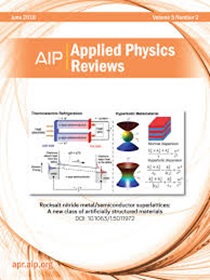Flexible magnetoelectric systems: Types, principles, materials, preparation and application
IF 11.9
1区 物理与天体物理
Q1 PHYSICS, APPLIED
引用次数: 0
Abstract
Recently, the rapid development of flexible electronic materials and devices has profoundly influenced various aspects of social development. Flexible magnetoelectric systems (FMESs), leveraging magnetoelectric coupling, hold vast potential applications in the fields of flexible sensing, memory storage, biomedicine, energy harvesting, and soft robotics. Consequently, they have emerged as a significant branch within the realm of flexible electronic devices. According to its working principle, FMES are divided into three categories: FMES based on magnetodeformation and piezoelectric effects, FMES based on giant magnetoresistive effect, and FMES based on electromagnetic induction. Although some articles have reviewed the first two types of FMES, there is a lack of systematic introduction of the FMES based on electromagnetic induction in existing studies, especially the development history and research status of the three types of FMES. Therefore, this paper systematically reviews the development history and research status of these three kinds of FMES and reveals the working principle and mode of the flexible magnetoelectric system from the perspective of the force-electricity-magnetism coupling mode. In addition, the material selection criteria, device manufacturing methods, and application fields of the FMES are also introduced. Finally, this review delves into the challenges and opportunities confronting the development of FMES, exploring the future development directions. This review aims to establish a theoretical foundation and provide methodological strategies for future research on FMES. It is anticipated to promptly address the current gap in this research field and facilitate the development of the flexible electronic family.柔性磁电系统:类型、原理、材料、制备和应用
近年来,柔性电子材料和器件的快速发展深刻影响了社会发展的各个方面。利用磁电耦合的柔性磁电系统(FMES)在柔性传感、记忆存储、生物医学、能量收集和软机器人等领域具有巨大的应用潜力。因此,它们已成为柔性电子设备领域的一个重要分支。根据其工作原理,FMES 可分为三类:基于磁变形和压电效应的 FMES、基于巨磁阻效应的 FMES 和基于电磁感应的 FMES。虽然一些文章对前两类调频电磁系统进行了综述,但现有研究中缺乏对基于电磁感应的调频电磁系统的系统介绍,特别是对这三类调频电磁系统的发展历史和研究现状的介绍。因此,本文系统回顾了这三种 FMES 的发展历程和研究现状,并从力-电-磁耦合模式的角度揭示了柔性磁电系统的工作原理和模式。此外,还介绍了 FMES 的材料选择标准、器件制造方法和应用领域。最后,本综述深入探讨了 FMES 发展面临的挑战和机遇,探索了未来的发展方向。本综述旨在为未来的调频电磁系统研究奠定理论基础并提供方法策略。希望能及时弥补目前该研究领域的不足,促进柔性电子家族的发展。
本文章由计算机程序翻译,如有差异,请以英文原文为准。
求助全文
约1分钟内获得全文
求助全文
来源期刊

Applied physics reviews
PHYSICS, APPLIED-
CiteScore
22.50
自引率
2.00%
发文量
113
审稿时长
2 months
期刊介绍:
Applied Physics Reviews (APR) is a journal featuring articles on critical topics in experimental or theoretical research in applied physics and applications of physics to other scientific and engineering branches. The publication includes two main types of articles:
Original Research: These articles report on high-quality, novel research studies that are of significant interest to the applied physics community.
Reviews: Review articles in APR can either be authoritative and comprehensive assessments of established areas of applied physics or short, timely reviews of recent advances in established fields or emerging areas of applied physics.
 求助内容:
求助内容: 应助结果提醒方式:
应助结果提醒方式:


